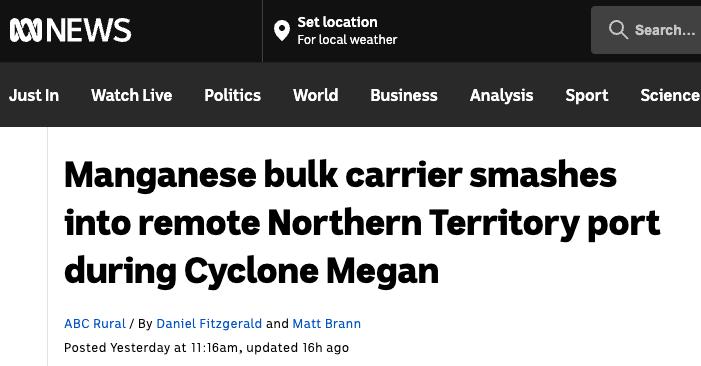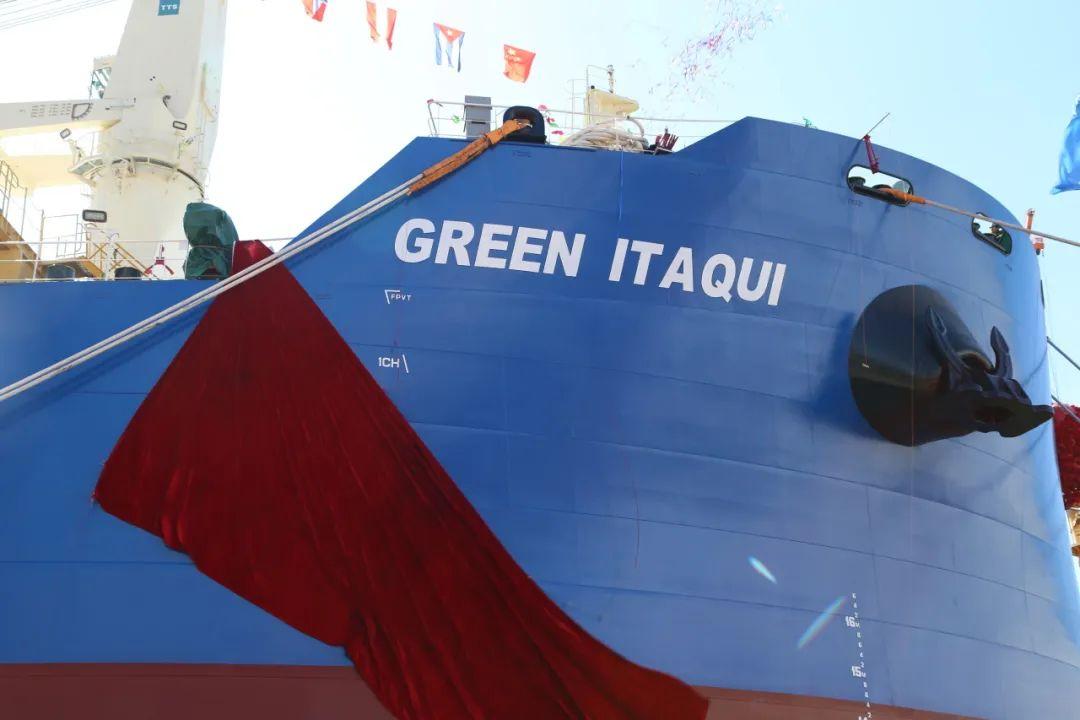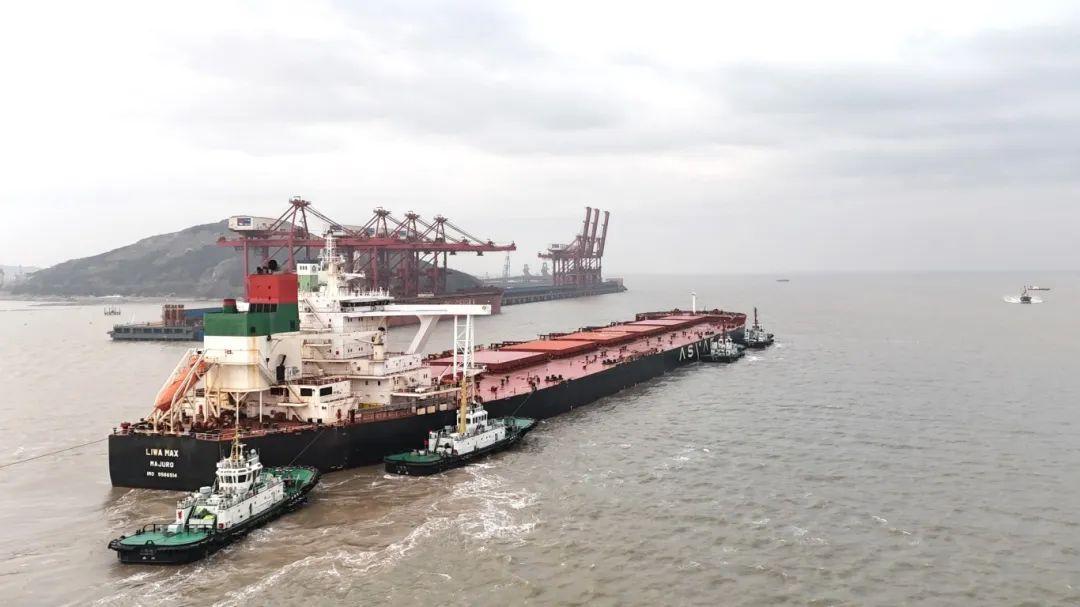《装卸时间与滞期费》第6版
CHAPTER 3 第3章
Commencement of laytime 装卸时间的起算
3.146 It would seem that the strict rule that all the vessel’s holds must be ready before notice of readiness can be given applies not only where the place of arrival is the place where loading is to be effected but also where the vessel can become an Arrived ship before moving into berth. However, in London Arbitration 10/06 the tribunal held that where a LPG tanker presented in order to load a quantity of cargo as coolant to complete the gassing up/cooling down process under her own generated inert gas, the presence of traces of ammonia and minute quantities of fluorides in some of the tanks, but not those required for the coolant, did not invalidate the notice of readiness presented by the master.
3.146这样看来,能够递交准备就绪通知书之前要求船舶的所有货舱都必须做好准备这一原则是非常严格的,它不仅适用于抵达了实际进行装货位置的船舶,而且还适用于靠泊前即将成为抵达船的船舶。然而,在报道的伦敦仲裁2006年第10号案中,仲裁庭裁定,该液化石油气船舶,为了装载一定量的货物,在她自己产生惰性气体过程中,需要冷却剂完成加气/冷却,而在一些液货舱存在有氨水或微量氟化物的痕迹,虽然这不是冷却剂所需要的物质,但这并不能使船长递交的准备就绪通知书失效。
3.147 Despite the strict requirements of the common law in relation to the physical condition of the holds or tanks prior to presentation of notice of readiness, it is always open to the parties to agree some other criteria. As was stated by Colman J in The Linardos:
. . . one must not lose sight of the fact that, although in general a valid notice of readiness cannot be given unless and until the vessel is in truth ready to load, it is always open to the parties to ameliorate the black or white effect of this principle by express provisions to the contrary, as recognised by Roskill LJ in The Tres Flores.
3.147尽管普通法对准备就绪通知书递交前有关货舱或油舱的实质性条件的要求很严格,对双方当事人来讲,他们总是可以自由约定一些其他的标准,正如Colman法官在The Linardos—案中所说的:
……一个不能被忽视的事实是,尽管一般来讲,除非而且只有等到船舶确实做好了装货准备,才能递交有效的准备就绪通知书。但是,对双方当事人来讲,他们始终可以通过订立相反的明示条款来改变这一白纸黑字的原则,这种作法Roskill大法官在审理The Tres Flores—案时也给予肯定。
3.148 This case concerned a standard form of Richards Bay coal charter, clause 4 of which provided as follows:
Time commencing... 18 hours after Notice of Readiness has been given by the Master, certifying that the vessel has arrived and is in all respects ready to load whether in berth or not...
Any time lost subsequently by vessel not fulfilling requirements for . . . readiness to load in all respects, including Marine Surveyor’s Certificate... or for any other reason for which the vessel is responsible, shall not count as notice time or as time allowed for loading...
The charter also incorporated the Richards Bay Coal Terminal Regulations.
3.148在The Tres Flores案涉及的是Richards Bay煤矿租船合同的标准格式范本,其中第4条款如下规定:
不论靠泊与否,只要船长递交了准备就绪通知书,证明船舶已经抵达并已在各个方面做好了装货准备,在18小时后即可起算装卸时间……
随后由于船舶未能在各个方面完全达到要求和做好装货准备,包括船舶检验证书……或者由于任何其他应由船舶负责的原因造成的任何时间损失,都不应该计为通知时间或者允许装货的时间……
该租船合同中还并入了南非Richards Bay煤矿码头的规定。
3.149 The problem arose because the vessel gave notice of readiness and, three days later, when she berthed, a local marine surveyor failed her because of water and rust in her hatches. Just under a day later, she was accepted for loading.
3.149产生的问题是,船舶已经递交了准备就绪通知书,三天后当她靠泊时,由于货舱内有积水和生锈,故未能通过当地的船舶检验。但就在这一天后,她就被接受进行装货了。
3.150 The arbitrator concerned found in favour of the owners, holding that the assumed intention of the parties must have been that, if congestion prevented the ship from berthing, notice of readiness might be tendered if given in good faith, even if she subsequently failed inspection. As Colman J pointed out on appeal in relation to lines 75/78, which provided for any time lost subsequent to tendering notice of readiness by the vessel not fulfilling requirements for free pratique or readiness to load in all respects, including marine surveyor’s certificate not to count as notice time or as time allowed for loading:
If it were not for lines 75/78, owners whose vessel having given notice of readiness at the anchorage, then had to wait for a period of several days or even weeks because no berth was available, was found on getting into berth to need one final washing of one or more of her cargo spaces, perhaps only a few hours work, could lose the benefit of all time lost at the anchorage. The printed form of this charterparty avoids that very commercially unbalanced result.
3.150审理该案的仲裁员的认定对船东有利,并裁定:可以想到,当事双方的意图一定是,假如由于港口拥挤而阻止船舶靠泊的话,如果船方是出于诚意,就可以递交准备就绪通知书,即使随后未能通过检验。犹如Colman法官在该案上诉时指出的,就合同中第75-78行的规定:船方递交准备就绪通知书后,由于她未能通过检疫或者未能在各个方面做好装货准备,包括未能取得船检证书,所损失的任何时间均不应计为通知时间或者允许的装货时间,他说道:
假如没有第75-78行的规定的话,在锚地递交了准备就绪通知书的船东,由于没有可用泊位,随后不得不再等几天甚至几周的时间,靠泊后却被发现还有一个或几个货舱需要做最后的清洗,或许这只是几个小时的工作,他就能够会失去在锚地损失的所有时间的利益好处。这份租船合同格式范本中印就条款就避免了这商业上极其不公的结果。
3.151 A similar result was reached in The Jay Ganesh, also a decision of Colman J in relation to a Worldfood charter, and in London Arbitration 17/92, a decision relating to a sugar charterparty. In this latter case, the clause concerned required the holds to be washed and dried if a cargo injurious to sugar had previously been carried but, if not, the holds only to be cleaned prior to loading, i.e. it could by implication be done after presenting notice of readiness. Any time thus lost would of course be for the owners’ account.
3.151在另一个由Colman法官判决的有关世界食品租船合同的The Jay Ganesh案,还有报道的伦敦仲裁1992年第17号案是有关食糖租船合同的一个裁决,也都得出了类似结论。在后一个案例中,所涉及的条款中要求:如果前一次所载的货物会污染糖的话,货舱就必须清洗、干燥,但如果不会的话,货舱仅在装货前清洁即可,也就是说,该条款默示,这项清洁工作可以在递交准备就绪通知书后进行。当然,因此(清洁)损失的时间应由船东承担了。
3.152 These cases were followed in London Arbitration 7/04. However, in London Arbitration 14/05, the tribunal held that a provision providing for any time lost “through lack of ship’s power, breakdown or insufficiency of equipment or any neglect on the part of the vessel, its Owners, Master or crew or their Agents affecting the loading or discharging operation” not to count as laytime, did not have the same effect as the clauses considered in The Linardos and The Jay Ganesh because, unlike those clauses, it made no reference to notices of readiness and the state of the vessel’s readiness for loading. They said that clearer language would be required referring specifically to the readiness of the vessel to load if it were to have the effect claimed by the owners.
3.152在报道的伦敦仲裁2004年第7号案也是遵循这些案例。然而在2005年第14号案中,仲裁庭判定:这一条款规定‘由于船舶缺乏的动力,故障或设备能力不足,或船舶,船东,船长或船员或他们的代理人方面的疏忽影响装/卸货作业’所导致的任何时间损失不计入装卸时间,它并没有像在The Linardos和The Ganesh案例中的条款所具有的效果,因为,不像那些条文,她没有提及准备就绪通知书和船舶准备装货的状态。他们说,如果要使其具有船东所声称的效果,需要更清晰的语言特别提到船舶做好装货准备。
3.153 With the exception of the last, the cases cited previously refer in the main to the physical condition of the holds but it is clear that the requirement that the vessel must be physically ready extends beyond this. One such case is London Arbitration 8/05. In that case the tribunal held that where a vessel arrived at a second discharge port with no anchors, she was unable to present a valid notice of readiness. However, in London Arbitration 14/05 although the tribunal did not consider the case to come within the principles enunciated in The Linardos and The Jay Ganesh (see the previous paragraphs) the tribunal was also not persuaded that the notice of readiness that was tendered was, in any event, invalid. The facts were that the vessel in question was first rejected by the harbour master for berthing, for defects relating to the vessel (as opposed to the condition of the holds), then passed although nothing had been done by the owners and the crew between the two inspections.
3.153除了最后一个案例,前面援引的案例大体上都提到货舱实质状况,但都是明显要求船舶必须实质上准备好,并且还远不止这些要求。在报道的伦敦仲裁2005年第8号案,正是这样一个案件。在该案,仲裁庭判决:当船舶抵达第2个卸货港而没有锚,是不能递交有效的准备就绪通知书。然而,在2005年第14号案,虽然仲裁庭认为该案不是在The Linardos和The Ganesh(见前面的段落)先例中阐述的原则适用范围之内,仲裁庭也不能相信准备就绪通知书在任何情况下是无效的。该案的事实是,由于涉及到船舶缺陷(相对于货舱状况),所争议的船舶在开始时被港务局长拒绝靠泊,后来检查后被放行靠泊,尽管船东和船员在此期间并没有采取任何措施。
Overstowed cargo 货物倒装/叠装/被压在下面
3.154 It sometimes happens that different parcels of cargo are carried on the same voyage in the same vessel, but under different contractual arrangements entered into directly by the owner. This may either be under multiple charters or under a charter which also contains a liberty to the shipowner to complete with other cargo. A typical clause of the latter type is the Centrocon completion clause, the gist of which reads:
Owners have the liberty to complete with other . . . merchandise from port to ports en route for owners’ risk and benefit, but... same not to hinder the... discharging of this cargo.
3.154有时会遇到这类情况,在同一艘船舶同一航次载运不同批次货物,但却是由船东根据所签订的这些不同的运输协议直接安排的。这种情况要么依据复合租船合同,要么依据某一租船合同,包含有一条自由条款赋予船东载运其它货物使船舶满载。后一种情况的典型条款见于标准谷物租船合同中的满载条款,其中心要点是:
船东有权自由在途中的各港加载承运其他……的货物,利益和风险均由船东自己承担,但……不可阻碍本货物的卸货。。
3.155 In either of these circumstances, a valid notice of readiness cannot be given in respect of the cargo which has been overstowed until all that cargo is accessible. However, it need only be accessible, it is not necessary that all the cargo that has been stowed on top be discharged before a valid notice can be tendered.
3.155不论是这些情况中的哪一种,对于已经倒装的货物,直到所以这些货物可以接近自由出入,才可以递交有效准备就绪通知书。然而,这仅要求是可以接近自由进入的,而不需要在有效准备就绪通知书递交前将装在其上面的所有货物都卸下。
3.156 In The Massalia (No 2) Diplock J held that, in the circumstances of that particular case, as notice had already been given, although premature, and as the charterers were already discharging the vessel from those hatches where their cargo was accessible, it was not necessary for a further notice, or to allow the period of time that would normally have had to elapse after a valid notice, before laytime could begin. This view has, however, been doubted in a later case.
3.156在The Massalia案,Diplock法官判定,在该案的特殊情况下,既然通知书已经递交,尽管有些过早,而且承租人已经能够从那些他们的货物可以接近自由出入的舱口把货卸下,那么,在装卸时间可以起算前,就没有必要再递交什么通知书了,或者也没有必要按通常的方式在递交了有效通知书后再让出一段时间(即通知时间)。不过,这个观点在后来的一个案子中受到质疑。

《装卸时间与滞期费》购买链接(点击可购买)
海运圈聚焦专栏作者 魏长庚船长(微信号CaptWei)

 2019-01-24
2019-01-24 450
450 













